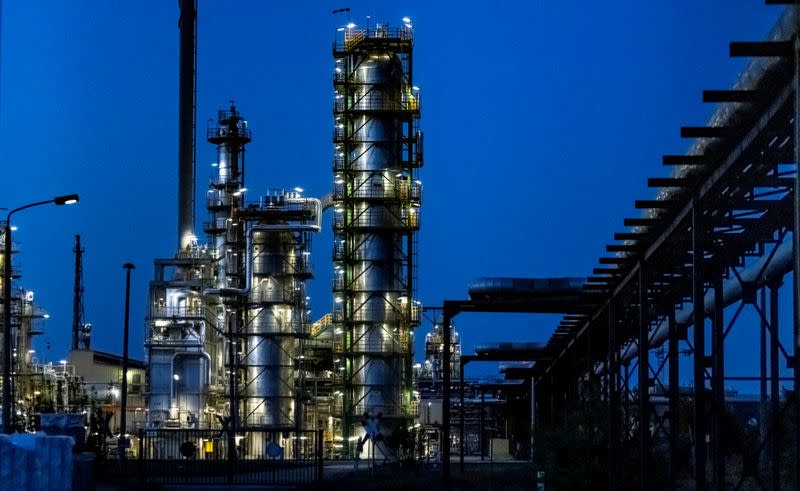Factbox-German refineries seek to operate without Russian crude

FRANKFURT/OSLO (Reuters) - Germany, the European Union's largest economy and its biggest oil market, aims to end its dependency on Russian crude oil by the end of the year due to Moscow's invasion of Ukraine.
Some refineries, such as one at Schwedt formerly controlled by Rosneft and TotalEnergies' Leuna, formerly depended on Russian crude supplies via the Druzhba pipeline.
But the German government on Sept. 17 put the Rosneft parts of the PCK Schwedt refinery and two other refineries under state trusteeship. It is working with energy firms and Poland, and talking to Kazakhstan, to find substitutes for Russian oil. [nL1N30N092]
This is under legislation that allows it to take control of foreign companies in the event of an emergency.[nL5N2X48SN
Total has said it is seeking to end its dependence on Russian oil as soon as possible.
Others, such as Miro, also partly owned by Rosneft and put under the same trusteeship, receive crude via the Transalpine (TAL) pipeline, which runs from the Mediterranean port of Trieste to Karlsruhe via Bavaria. The Federal Network Agency, a regulator, operates the trusteeship.
Varo Energy which has a stake in Bavaria's Bayernoil, where Rosneft's stake has also been put under trusteeship by Berlin, has said it uses crude from sources other than Russia.
Germany received 32% of its crude oil from Russia in January to June, down from 40% before the invasion, data from statistics office BAFA showed. In June alone, Russia's share of Germany's crude oil imports was only 24%.
Most oil comes via Rotterdam but Germany also operates reception facilities at the North Sea port of Wilhelmshaven.
The country's 10 largest refineries are together able to process 2.1 million barrels per day or 104 million tonnes per year of crude oil.
Capacity Owner
Refinery Operator
bpd mtpa
Rheinland 354,000 17.6 Shell Shell (100%)
Miro 313,000 15.6 Miro Rosneft (24%)*, Phillips 66
Continental (18.75%), Esso
Deutschland (25%), Shell
(32.25%)
Gelsenkirchen 265,000 13.2 BP BP (100%)
Schwedt 233,000 11.6 PCK Rosneft (54.17%)*, Shell
(37.5%), Eni (8.33%)
Leuna 240,000 12.0 TotalEnergies TotalEnergies (100%)
Bayernoil 206,000 10.3 Bayernoil Varo Energy (51.43%), Rosneft
(28.57%*), Eni (20%)
Ingolstadt 110,000 5.5 Gunvor Gunvor (100%)
Holborn 100,000 5.0 Holborn Oilinvest (100%)
Lingen 97,000 4.8 BP BP (100%)
Heide 90,000 4.5 Heide Klesch Group (100%)
Burghausen 76,000 3.8 OMV OMV (100%)
* under state
trusteeship
Source: Shell, BP annual reports; company websites; Germany oil industry association en2x.
(Compiled by Vera Eckert and Nerijus Adomaitis; Additional reporting by Benjamin Mallet and Rowena Edwards: Editing by Bradley Perrett)

 Yahoo Finance
Yahoo Finance 